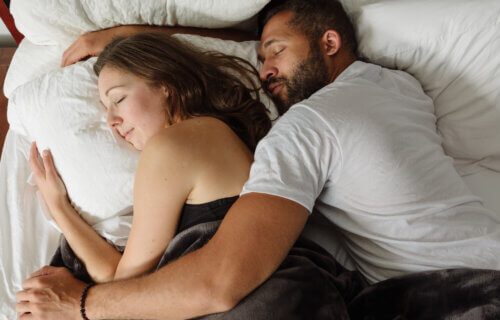TUCSON, Ariz. — Whether you’re spooning or on the opposite side of the bed, adults sleep better together than they do alone, research shows. The benefits of sharing the bed with a partner include less insomnia, less fatigue and more time asleep as well as nodding off quicker.
A team from the University of Arizona set out to explore the relationship between bed sharing, sleep and mental health. Their research concludes that adults who share a bed with a partner or spouse enjoy better sleep compared to people sleeping alone. They show that sleeping with a partner is associated with lower depression, anxiety, and stress scores, and greater social support and satisfaction with life and relationships.
Conversely, sleeping alone is associated with higher depression scores, lower social support, and worse life and relationship satisfaction.
Parents who let their kids in the bed at night shouldn’t breathe a sigh of relief, however. Sleeping with children was found to be associated with more stress. Those who slept with their child most nights reported greater insomnia severity, greater sleep apnea risk, and less control over their sleep.
Meanwhile, results show that those who shared a bed with a partner most nights reported less severe insomnia, less fatigue, and more time asleep than those who said they never share a bed with a partner. Those sleeping with a partner also fell asleep faster, stayed sleeping longer after falling asleep, and had less risk of sleep apnea.
“Sleeping with a romantic partner or spouse shows to have great benefits on sleep health including reduced sleep apnea risk, sleep insomnia severity and overall improvement in sleep quality,” says lead author Brandon Fuentes, an undergraduate researcher in the department of psychiatry at Arizona, in a statement.
Adds senior study author Dr. Michael Grandner, director of the Sleep and Health Research Program at the university: “Very few research studies explore this, but our findings suggest that whether we sleep alone or with a partner or family member may impact our sleep health. We were very surprised to find out just how important this could be.”
The study involved an analysis of data collected in the Sleep and Health Activity, Diet, Environment, and Socialization (SHADES) study of 1,007 working-age adults from southeastern Pennsylvania. Bed sharing was evaluated with surveys, and sleep health factors were assessed with common tools such as the Epworth Sleepiness Scale, Insomnia Severity Index, and STOP-BANG apnea score.
An abstract of the findings is published in the journal Sleep online and the study was presented at SLEEP 2022, the annual meeting of the Associated Professional Sleep Societies, a joint venture of the American Academy of Sleep Medicine and the Sleep Research Society.
South West News Service writer Jim Leffman contributed to this report.

When you lose your other half you lose everything. My husband of 32 years died 5 years ago. Rare to sleep all night. Miss taking his hand in middle of night and he doing same to me as we fell back to sleep.
But his dirt nap is going really, really well..!
Douche
I am betting you need one, Jackhole, you smell bad down there…
Nasty
No … *nasty* would be if she was still sleeping with the guy after he died.
Kevin – you are a loser.
What a jerk; don’t tell me you’re single.
Sharron, in a couple of months I will have been married 30 years. I’m sorry for your loss.
Not us! 10 years not in the same bed.
This study should get the No, Sherlock award.
This may be true unless your partner snores like a gut-shot panther.
You’ve slept with a gut-shot panther..?
Kevin, you are a dark spirit. Not a compliment or joke.
My husband snored so loud I could hear him from the farthest room in the house. He refused to acknowledge the issue. I had 10 years of terrible sleep. Then he hooked up with a new woman and left. From what his kids tell me she sleeps in a separate room for the same reason. I now sleep like a baby.
Babies are really light sleepers, not very good at sleeping…
Also correlates to a much greater chance of boinking, according to the YES-BANG index.
As of writing this, there are 7 likes and 21 dislikes.
That tells the story.
In other words, three out of four people sleep better alone.
Dogs like to sleep together too. Probably for the same reason.